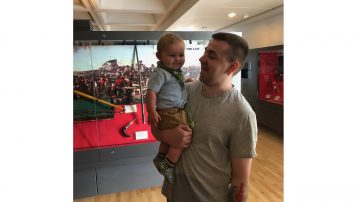I pride myself on my fearlessness to talk about “taboo” subjects. Very little can shock me, and I have no qualms discussing sex, bathroom stuff and underwear wedgies with my friends. I’ve been candid about my bloody and painful periods to boyfriends and once discussed the qualms of childbirth with a guy I had a crush on. However, when it comes to living with C-PTSD and trauma, I find myself with a tied tongue and an irrepressible need to disappear into a bush like the Homer Simpson GIF.
The mental health conversation is progressing (albeit slowly) in 2018, and yet I find that speaking out about abuse, especially emotional, and its consequences is still met with so much stigma and misunderstanding. If I hear another person saying any variation of “he’s family, he loves you”, “you should forgive him”, and my favourite, “are you sure [insert invalidating comment here]?” I’m going to shove my bloody pad down their throat.
I have yet to find a way to bring up my Tragic Backstory™. Is it something that I should mention on the get-go, like *handshake* “Hi, I’m Anne Sophie and I’ve been abused, nice to meet you”? Should I hide it until I have no choice but to bring it up? Should I act like the girls in black-and-white Tumblr GIFs and make it my “dark edge” that makes me different and misunderstood from everyone else? Somehow that doesn’t sound healthy or even truthful. With abuse being (sadly) way more common than we like to think, my trauma really isn’t that “unique”. Still, the idea of being open about what happened terrifies me.
However, I am usually open with people I know and trust. Talking about it with friends usually leads to positive experiences and a deeper connection. And if they’re not understanding, they’re not my friends.
My biggest struggle is talking about it with potential lovers. Somehow, I feel like it is written all over me, like a stain or a foul smell you just can’t get off. I worry that if I tell them, they will think differently of me and will stop wanting to see me. Or when it falls out, I always feel it is because they could sense my fragility and my shame. In an age of dating where you are supposed to be carefree, confident and easy to be with, how do you fit trauma and emotional co-dependency into the conversation? How do you say that you were broken? These days even the word “therapy” sends a guy running. And I don’t want to disclose something so personal to someone I may never see again.
My first version of this story was cynical and jaded. I had nothing hopeful to add. But recently I owned my trauma like never before. I was on a boat tour with ~someone~, who asked me if I got along well with my family. Oooh. “Not this one member”, I said. “I had to cut them off because they were abusive”. “Fair enough”, was the reply. As the time has passed with ~someone~, I once asked them: “could you tell?” They said a little, but that there was so much more to me that they wanted to know better. My trauma, too.
I still carry shame. I still get triggered by old men’s legs (yep). But my trauma is not all there is to me, and there is so much more to discover in any trauma survivor than just their trauma.



